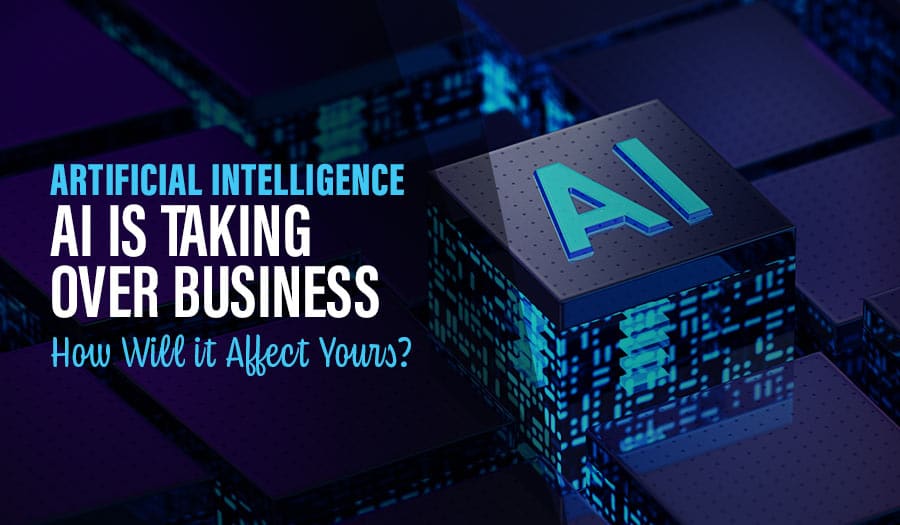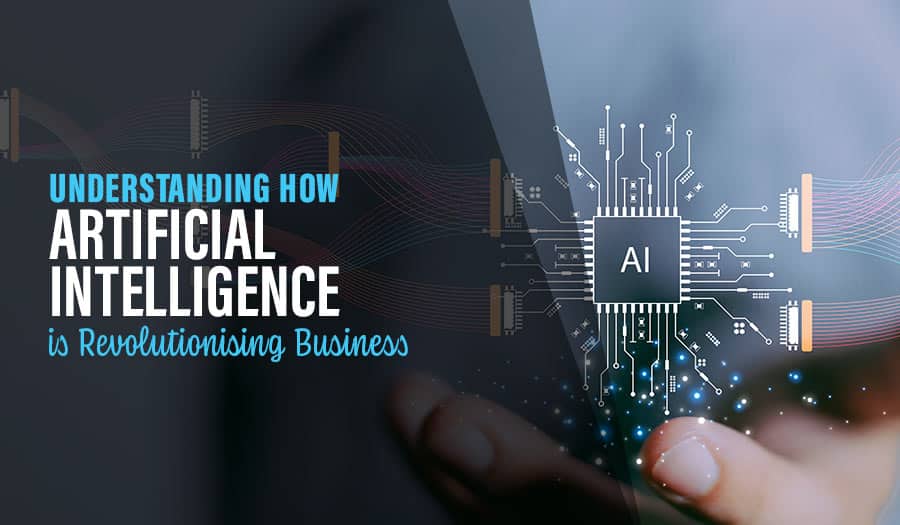AI Technology and Artificial intelligence(AI) has been a heavily discussed topic in the business world. Many large companies are already investing in this technology in a bid to produce better products, reach the right audience, and gain a competitive edge.
With recent technological developments, AI is no longer limited to large technology enterprises. Smaller businesses and medium-sized companies can share the pie too.
AI can do a lot of good for businesses. We’re already seeing AI cut costs and help improve products and services that most modern companies offer.
Today’s article helps you stay in the loop of AI Technology use in business. Precisely, how can AI propel your business forward? Which areas can AI bring improvements in? And most importantly, how can you gain a competitive advantage with the help of AI?
But before that:
What is AI Technology?
AI is a type of technology where machines, such as computer systems, are trained to think and act like humans.
As per Tech Target, ‘AI is the simulation of human intelligence processes by machines, specifically computer systems.”
The star behind AI is data. Basically, AI systems ingest large batches of labelled data and then analyze this data to pull out patterns and correlations within the data. Finally, the AI system will make future predictions based on the data it was fed.
AI relies on rules known as algorithms to provide computer systems with instructions on turning data into reliable information or completing tasks.
AI’s ability to analyze large batches of data and create useful information makes it an asset for business owners. In cases where data batches and repetitive processes are the norm, AI works better than humans.
With AI, businesses can build systems that automate processes, analyze customer behaviour, improve products and more.
As a quick example, AI Technology is the reason why companies like Google continually provide tailored experiences to their users.
Closer home technologies such as Alexa and Google’s Siri are top examples of AI in action.
Applications of AI in Business
AI has tons of uses within business environments. By investing in these AI business applications, companies can save costs, improve customer service, and deliver top-notch products to their companies.
In fact, nine out of ten businesses have ongoing investments in AI, according to a New Vantage 2020 study. This would not be the case if AI were not producing profitable ROI.
So how exactly are technology-forward companies utilising AI?
Let’s explore below.
1. Customer and market analysis
Machine learning is one aspect of AI that comes in handy when companies want to understand their customers and markets better. Essentially, machine learning enables a computer system to analyze troves of data and make predictions.
This section of AI now features heavily in business through integration into platforms such as customer relationship management (CRM) platforms. When integrated into CRM and other customer-facing platforms, AI can map consumer behaviour patterns. It can also make predictions on how a business should market to customers or interact with them.
Businesses are also using AI’s predictive analysis aspect to find out places where they can find their target audience. In addition, AI can help businesses uncover untapped markets and spaces.
2. Process automation
Present-day companies use AI functions, such as robotic process automation (RPA), to automate repetitive tasks during production. RPA and machine learning combined can automate processes within a company. The end result is fewer process errors, faster production, and quicker time to market. In addition, automation helps a company save on production costs and labour.
In another example, companies, especially manufacturing plants, use AI to build digital twins.
Digital twins are a virtual copy of a physical business or production environment. The digital twin helps businesses automate, improve, and streamline their processes. For instance, a digital twin can help a manufacturing plant diagnose manufacturing issues in real-time. It can also showcase processes that need revamping or optimization for a company to gain a competitive edge.
3. Product enhancement
AI is also used today to improve a company’s products. A good example is the use of generative design to develop the products that fit your audience best.
Generative design relies on parameters such as (size, cost, weight, and materials) that a designer feeds into an AI platform. The AI platform will then produce multiple iterations of a product, and designers can choose or prototype the best product for customers.
Companies can also invest in AI to perform quality assurance and ensure all products are up to par.
4. Personalized customer experiences
Another primary application of AI in business is in the customer experience sector. AI comes in handy for companies with a vision of providing streamlined customer experiences.
Businesses achieve this through several means, such as chatbots and marketing backed by AI. The former lets businesses offer 24/7 support to customers. Specifically, chatbots enable customers to get answers to almost any query they have.
Self—portals are another way companies use AI to provide personalized customer interaction. In most cases, the self-portal is AI backed and allows customers to tailor their interactions with a company based on their needs and preferences.
One example of an AI-backed self-portal platform is a glassware company that lets customers have a virtual try-on to find the right fit of glasses.
In another example, ecommerce business owners can use AI to create super personalized products for their consumers.
5. Cybersecurity
As many as 21% of global organisations experienced a ransomware attack in 2022. This is no surprise, as cybersecurity criminals now have access to high-tech technologies to build smart threats that bypass security controls.
However, AI comes to the rescue. Businesses can use AI to build automated security systems. For instance, these systems can continually monitor a company’s technology ecosystem for threats. If a threat is present, AI technology can send an automated message to the relevant authority for mitigation.
6. Recruitment
In a 2018 study, 67% of hiring managers said AI made their jobs easier. Today, more businesses continue to enjoy the benefits AI brings to acquiring talent in a company.
Specifically, the use of AI in recruitment is helping businesses hire faster. For example, businesses use automated applicant tracking to weed out resumes that don’t meet a job description. So, instead of recruiters spending up to 23 hours for each successful hire, they can spend less time filling one role thanks to AI. More importantly, companies save money during the recruitment process.
Top benefits of AI Technology For Businesses
Overall, AI can help businesses save on production costs, hire faster, and improve products. For example, a McKinsey study shows that 66% of decision-makers cited that AI helped them increase their profits. In addition, the group said that AI helped their companies stay on track with their goals.
AI is also vital in speeding up decision-making within a company. This technology also improves the quality of decisions a company makes as it avails structured data and uncovers patterns within a particular situation.
AI Disadvantages in Business
Even though AI brings a lot of advantages to businesses, there are several disadvantages of AI businesses should know about.
Lack of transparency: Some AI systems are designed to be “black boxes” that are difficult for businesses to understand. This lack of transparency makes it difficult for businesses to trust the decisions made by AI systems. This is especially difficult in sectors such as finance and health.
Bias and discrimination: AI systems can perpetuate existing biases in the data they are trained on, leading to discriminatory outcomes in business decision-making.
Cybersecurity risks: Like most technologies, AI systems can be vulnerable to hacking and cyberattacks. These smart attacks compromise sensitive business information and lead to negative consequences.
Lack of accountability: It’s difficult to determine who is responsible for the actions of AI systems, especially in cases where they cause harm or losses.
High implementation costs: Implementing AI technology in a business can be very expensive, especially for small and medium-sized businesses. However, as technology advances and adoption increases, AI becomes more affordable to smaller businesses.
What Does the Growth of AI Technology Mean For Businesses in the Future?
AI will continue to be a significant part of how future businesses operate. This technology will take over manual, repetitive tasks and streamline processes and product development.
Fortunately, AI will not be only beneficial to large organisations. Advancements in tech and greater adoption will make AI more affordable, even for small businesses.
Unlike what the masses fear, AI is not out to get employees’ jobs. It will be a couple of years before we start to see such disruptions in the business world.
However, we’re already seeing AI in action with most things in our lives. So, it won’t be a surprise to see AI seep into almost all aspects of a business. Smart companies already plan to invest in AI and improve their overall business.
If you’re not investing in AI, you’re missing out on many business benefits that could propel your business forward.
Let Sydney’s leading Web Design Agency take your business to the next level with a Pixel Fish Small Business Website.
Check out some of our latest Website Design projects.
View some of our case studies:
Virtue Advice
Eduworks
Matrix Medical Innovations
Tech Abstract
Mentor1
Friendly Pharmacy
More Reading
Top 10 reasons to choose WooCommerce for your business
How to Successfully Create a Business Social Media Strategy
How to promote your business via Linkedin
How AI Technology Could Impact Your Business In The Future
7 Top Ways E-Commerce is Changing for Business
How a Professional Website Can Help Your Small Business Unlock Its Full Potential
IT and Technology Website Design
How To Use Your Website to Gain Customers for Your Business



